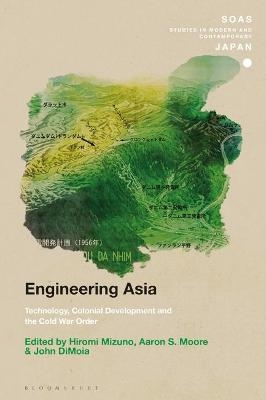
Engineering Asia
Bloomsbury Academic (Verlag)
978-1-350-15067-6 (ISBN)
Through highlighting how these networks helped shape Asia’s contemporary economic landscape, Engineering Asia challenges dominant narratives in Western scholarship of an ‘economic miracle’ in Japan and South Korea, and the ‘Asian Tigers’ of Southeast Asia. Students and scholars of East Asian studies, development studies, postcolonialism, Cold War studies and the history of technology and science will find this book immensely useful.
Hiromi Mizuno is Associate Professor of History at the University of Minnesota, USA. She is the author of Science for the Empire: Scientific Nationalism in Modern Japan (2009). Aaron S. Moore is Associate Professor of History at Arizona State University, USA. He is the author of Constructing East Asia: Technology, Ideology, and Empire in Japan’s Wartime Era, 1931-1945 (2013). John DiMoia is Associate Professor of Korean History at Seoul National University, South Korea. He is the author of Reconstructing Bodies: Biomedicine, Health, and Nation-Building in South Korea since 1945 (2013).
1. Introduction: A Kula Ring for the Flying Geese: Japan's Technology Aid and Postwar Asia, Hiromi Mizuno (University of Minnesota, USA)
Part 1: Engineering Asia at Home - Japan's Institutional Infrastructure for Asian Development
2. Tokyo's Vision of Southeast Asia: Private Interests and Economic Cooperation in the 1950s, Jin Sato (University of Tokyo, Japan)
3. Itagaki Yoichi and the Formation of the Postwar Knowledge Infrastructure for Japan's Overseas Development Assistance in Asia, Masato Karashima (Kobe University, Japan)
Part 2: Engineering Asia on the Ground
4. From 'Constructing' to 'Developing' Asia: Japanese Engineers and the Formation of the Post-Colonial, Cold War Discourse of Development in Asia, Aaron S Moore (Arizona State University, USA)
5. The Hydrocarbon Ring: Indonesian Fossil Fuel, "Japanese Cooperation," and American Neo-Imperialism, 1941-1975, Eric Dinmore (Hampden-Sydney College, USA)
6. Colonial Seeds and Imperialist Genes: Japanese Colonial Agricultural Development and the Cold-War Green Revolution, Tatsushi Fujihara (Kyoto University, Japan)
Part 3: South Korea - Engineering Asia as a Developing Nation
7. Postcolonial Desire and the Tripartite Alliance in East Asia: the Hybrid Origins of a Modern Scientific and Technological System in South Korea, Manyong Moon, (Chonbuk National University, South Korea)
8. Making Miracle Rice: Tongil and Mobilizing a Domestic “Green Revolution” in South Korea,
Tae-ho Kim, (Chonbuk National University, South Korea)
9. In Pursuit of “Peace and Construction”: Hyundai Construction and Infrastructure in Southeast Asia, 1965-1973, John P DiMoia, (Seoul National University, South Korea)
| Erscheinungsdatum | 21.02.2020 |
|---|---|
| Reihe/Serie | SOAS Studies in Modern and Contemporary Japan |
| Verlagsort | London |
| Sprache | englisch |
| Maße | 156 x 234 mm |
| Gewicht | 381 g |
| Themenwelt | Geschichte ► Allgemeine Geschichte ► Neuzeit (bis 1918) |
| Geisteswissenschaften ► Geschichte ► Regional- / Ländergeschichte | |
| Geschichte ► Teilgebiete der Geschichte ► Technikgeschichte | |
| ISBN-10 | 1-350-15067-3 / 1350150673 |
| ISBN-13 | 978-1-350-15067-6 / 9781350150676 |
| Zustand | Neuware |
| Haben Sie eine Frage zum Produkt? |
aus dem Bereich


